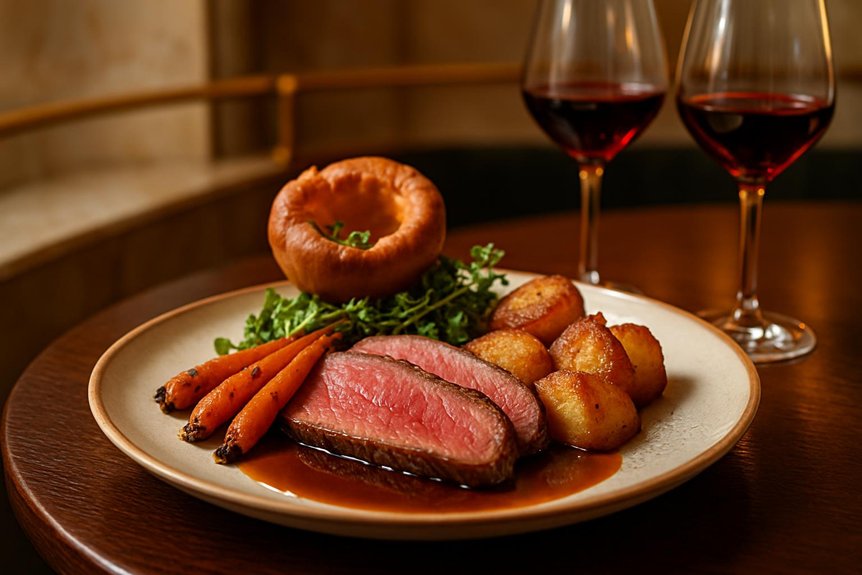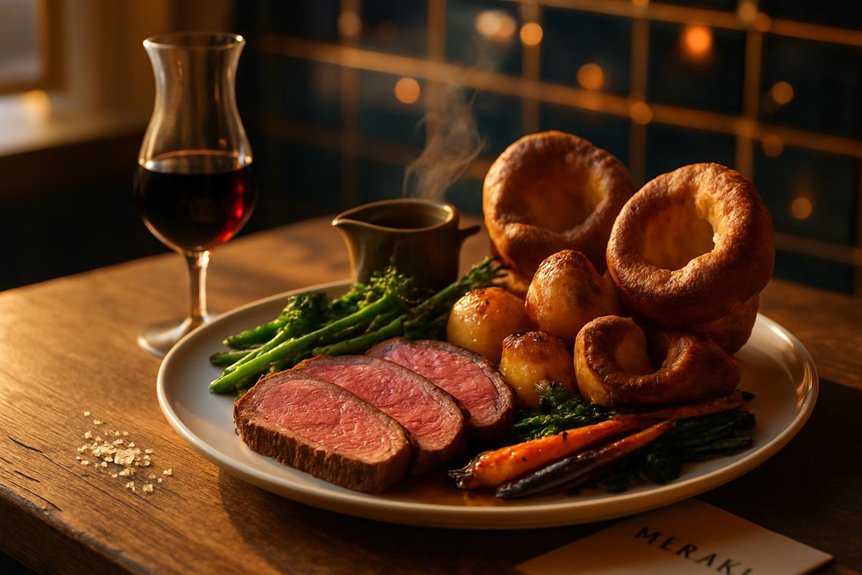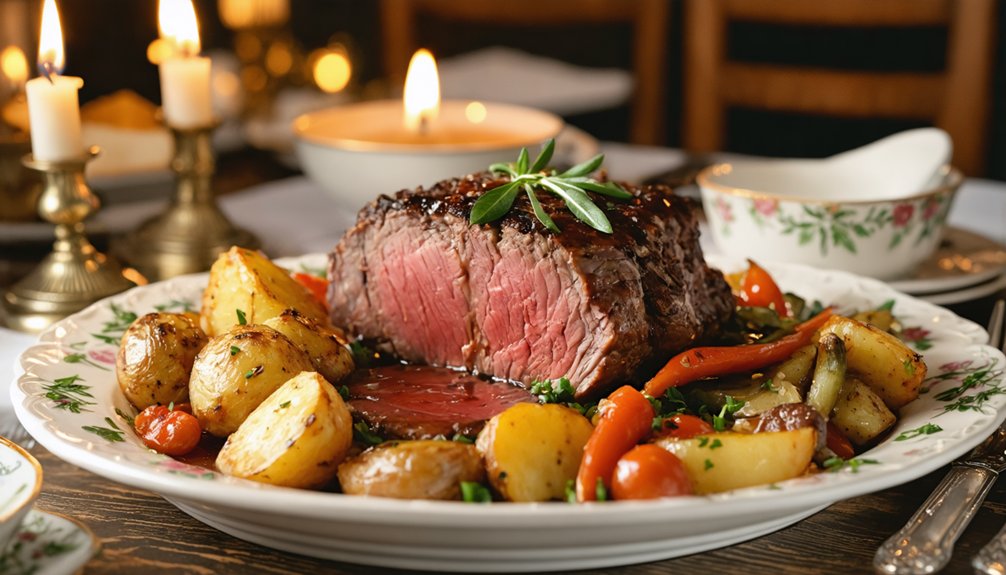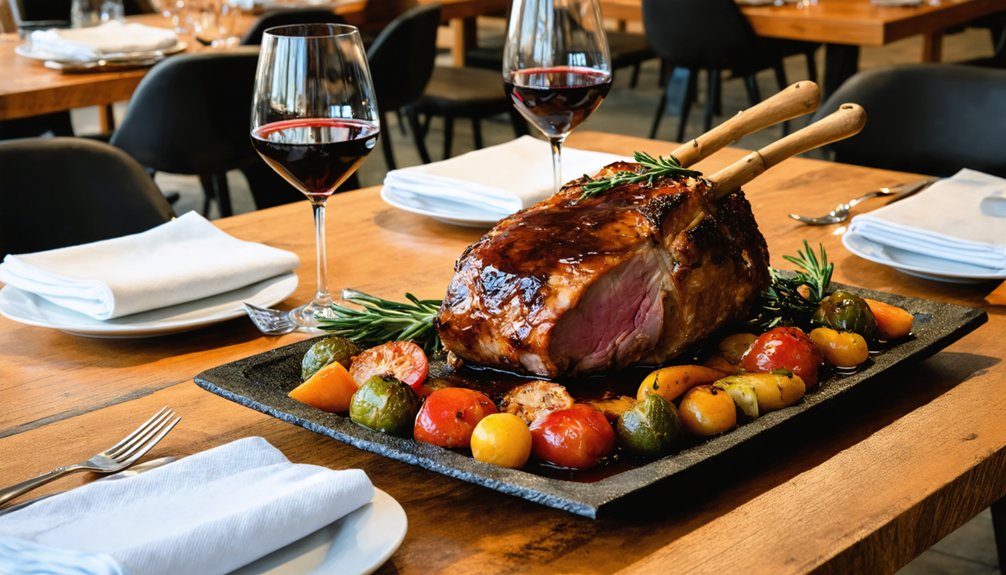Meraki approaches London’s Sunday roast with restraint and craft. Wood-fired meats arrive beside charred brassicas, pillowy puddings, and bright herb oils. Greek pantry notes—wild oregano, lemon, and olive—meet British seasonality in quiet balance. Sauces glide rather than shout; textures carry the story. Shared plates encourage a slower table, where smoke and citrus linger. It feels familiar, yet slightly altered, as if tradition has shifted a step to the side—just enough to prompt the next question.
From Yorkshire Pudding to Pita: A Culinary Bridge
Though separated by geography and tradition, Yorkshire pudding and pita share a common logic: simple batters transformed by high heat into vessels for savory comfort. Each traces distinct historical origins—dripping-fed tins in Northern England, dome-oven inflation across the Levant—yet both prize an airy pocket inviting roasted meats and pan juices.
In Meraki’s Sunday context, the link becomes a practical bridge: the English roast’s juices meet pliant, char-kissed bread without sentimentality. Culinary fusion here is structural rather than decorative, privileging texture, steam, and timing. Batter ratios echo dough hydration; blistered surfaces signal readiness for carving’s aftermath. The modern transformation of the classic Sunday roast at Meraki emphasizes an innovative blend of tradition and creativity.
The Greek Pantry Meets British Seasonality
How does a Cycladic larder converse with a Chilterns hedgerow? At Meraki, the dialogue is seasonal and precise. Spring nettles meet creamy feta; autumn parsnips find brightness in lemon and oregano.
The kitchen respects British harvest rhythms while drawing on an Aegean pantry: capers, wild thyme, kalamata olives, and Cretan honey. These elements nudge familiar roast accompaniments toward fusion flavors without losing their identity.
Spice blending is disciplined rather than showy. Smoked paprika lifts root vegetables; coriander seed echoes the sweetness of carrots; marjoram softens brassicas.
Anchovy and olive oil replace heavy gravies with salinity and gloss, letting British meats and produce stay central. Pickled grape vine shoots and dill deliver snap and perfume, proving seasonality can be amplified, not masked, by Greek nuance.
Exceptional service elevates the dining experience, ensuring that every visit to Meraki is memorable and unique.
Wood-Fired Techniques That Deepen the Roast
Even before the joint hits the flames, wood choice determines character: oak offers steady heat and toast, olive wood lends a resinous sweetness, and a touch of beech adds clean smoke. At Meraki, wood selection is matched to cut and fat content, shaping crust, color, and aroma. Fire management follows, precise and vigilant: a hot initial bed for searing, then a moderated ember field to carry the cook without scorching. Grates are positioned to favor convection over flare-ups, while vents and door openings meter oxygen. Drippings meet the ember edge, vaporizing into savory perfume rather than igniting. Periodic rotation prevents hot-spot bias, keeping collagen conversion even. Resting near the hearth, not the blaze, preserves juices and guarantees the wood’s subtleties read clearly in every slice. The Mediterranean cuisine at Meraki showcases authentic Greek flavors with a strong emphasis on seasonal ingredients, enhancing the dining experience with vibrant tastes and textures.
Shared Plates That Redefine Sunday Gathering
Shared plates set a new rhythm for the roast, led by generous family-style carving boards that invite communal pacing and conversation.
Alongside, a seasonal mezze medley introduces bright textures and agile flavors—pickles, charred vegetables, and herbed dips.
Together, they shift the meal from plated tradition to a flexible, pass-the-board ritual.
Family-Style Carving Boards
Why does a roast taste better when carved at the table? The answer, at Meraki, is ritual and precision. Family-style carving boards arrive as curated centerpieces: bronzed lamb shoulder, crisp-skinned chicken, or sirloin resting beside roasted roots and herb jus.
Attentive pacing preserves heat and texture, while tableside slicing releases aroma at the moment of serving.
The composition reflects local ingredient sourcing and traditional cooking methods: slow roasts, flame-kissed finishes, and patiently reduced gravies. Portions are calibrated for sharing, encouraging diners to choose cuts—lean, marbled, or end pieces—without ceremony. Sauces and condiments sit within reach to adjust each bite.
The board becomes a practical framework for conversation, ensuring equitable distribution, consistent temperature, and a clean, efficient path from carving knife to plate.
Seasonal Mezze Medley
As the carving boards are cleared, the table shifts to a lighter cadence with a seasonal mezze medley that invites grazing without hierarchy. Bowls and plates arrive in measured rhythm: herb-bright hummus, charred aubergine with smoked yogurt, and citrus-splashed lentils that echo market freshness. Seasonal influences guide each component—early peas folded into whipped feta, pickled spring onions sharpening slow-roasted beets, tomatoes macerated with oregano and kalamata oil.
Fusion techniques surface without showmanship: tahini warmed with miso depth; harissa brushed onto grilled squid; sesame dukkah scattered over roast carrots. Pita is blistered, olive oil peppery, acidity disciplined. The effect is communal yet precise, a recalibration of Sunday rituals where conversation stretches, appetites reset, and sharing replaces sequence.
Herbaceous Brightness: Sauces, Oils, and Zests
The herbaceous counterpoint to roast richness begins with vivid condiments that cut, lift, and perfume. At Meraki, brightness is engineered through restrained layers: a first-press olive oil stirred with parsley and mint, a flicker of citrus zest, and a measured squeeze of lemon to tighten the palate.
Anchoring notes come from capers, wild oregano, and a discreet garlic bite, all balanced to frame rather than mask.
Sauces stay nimble. A verdant chimichurri tilts toward dill and tarragon, while a silky tahini-lemon dressing gains lift from grated fennel fronds. There is also a cold emulsion of basil stems and green chili, whispering heat without dominance. Zested finishes and herb oils are applied tableside, ensuring aromatic bloom at the last moment, preserving freshness throughout the roast experience.
Signature Proteins: Lamb, Chicken, and the Sea
On the plate, signature proteins carry the roast’s identity with quiet confidence. Lamb arrives blushing and fragrant, its fat rendered to a lacquered edge that cracks softly under the knife. Rosemary’s whisper is present, but restraint guides the seasoning, letting pasture-rich depth speak first.
Chicken follows with crisp skin and succulent fibers, brined for tenderness, then glazed lightly to echo hearth aromas without masking purity.
From the sea, a firm white fillet stands in dialogue with tradition, seared to a buttery flake that holds its shape. Here, Fusion fusion reads as subtle cultural crossover: citrus-coriander brushstrokes on lamb, cumin-honey gloss for chicken, miso-splashed pan juices for fish. Each element aligns with the roast’s cadence, elevating comfort without compromising its core.
Vegetables in the Spotlight: Crisps, Char, and Smoke
Crispy roots snap against silky purées, setting a textural counterpoint to the roast.
Charred brassicas bring bitterness and sweetness, their edges blistered for depth.
Smoky allium accents thread through it all, adding warmth and a lingering finish.
Crispy Roots, Silky Purées
While Yorkshire puddings rise and joints rest, attention shifts to roots and brassicas rendered with contrast: shatteringly crisp edges against velvety purées. At Meraki, the plate pivots on texture. Paper-thin parsnip and beet crisps snap, releasing concentrated sweetness, while a buttery celeriac purée carries quiet depth.
Carrot is slow-roasted, then pressed and seared, its exterior lacquered, its interior tender.
Technique drives the precision. Elements of molecular gastronomy appear discreetly: low-temperature confit to stabilize sugars, dehydration for intensified flavor, and xanthan-lightened purées that hold a satin sheen without cream.
Seasoning leans on miso and roasted yeast for umami, enabling seamless vegan adaptations. A drizzle of parsley oil and toasted seeds supplies aromatic lift and crunch, letting roots command the roast with measured restraint.
Charred Brassicas Brilliance
How does char transform humble brassicas into the meal’s quiet provocateurs? At Meraki, charred brassicas arrive lacquered with smoke-kissed edges and tender cores, their nuttiness heightened, their bitterness tamed. The kitchen leans on sustainable roasting, letting high heat and restrained oil coax out concentrated sweetness while preserving snap.
Broccoli, cabbage, and sprouts gain a delicate crunch that counters richer elements on the plate, recalibrating the roast’s center of gravity without showboating.
- Textural contrast: blistered leaves and crisp florets frame juicy interiors.
- Flavor layering: caramelized notes mingle with subtle earth, amplifying savoriness.
- Minimal adornment: lemon zest, toasted seeds, or cultured butter, used sparingly.
- Responsible technique: sustainable roasting reduces waste, favors seasonal supply, and maximizes flavor per gram.
Their quiet precision keeps the roast agile and memorable.
Smoky Allium Accents
From charred brassicas to the kitchen’s other quiet agitators, smoke finds a sharper register in the allium family. At Meraki, onions, leeks, and spring garlic are handled with restraint, then nudged toward intensity over smoldering coals. The result is smoky allium accents that lean savory-sweet, tightening the roast’s edges without overpowering it.
Charred leek hearts arrive lacquered with their own juices; grilled scallions slip in citrus and pepper; a slow-smoked onion purée anchors the plate with velvet depth. Each element offers flavor enhancement through contrast: caramel against ash, sweetness meeting salinity.
A drizzle of warm beef fat over coal-kissed shallots ties the garnishes to the joint. Nothing shouts. Instead, the smoke threads the course, clarifying textures and sharpening the final bite.
Pairings and Pours: Wines, Ouzo, and Cocktails
Curiously, the ritual of Sunday roast invites a spectrum of pours that can elevate each element on the plate. At Meraki, selections pivot between Greek verve and London nuance, aligning texture and aroma with roast depth.
A chai pairing underscores spice-rubbed meats, while citrus and anise echo the kitchen’s smoky allium accents. Ouzo, served chilled, cleanses and resets; wine flights pace the meal without overpowering.
- Crisp Assyrtiko: saline, lemon pith, ideal for bronzed potatoes and charred leeks.
- Xinomavro or Nebbiolo: taut tannins cut fat in lamb or beef, preserving herb detail.
- Ouzo over rock: licorice bloom, palate-cleansing between gravy-laden bites.
- Martini riff with thyme cocktail garnish: brisk, mineral; or a bergamot highball that mirrors roast’s caramel notes.
Conclusion
As plates are cleared and glasses rest half-full, Meraki’s Sunday table leaves a lingering hush of satisfaction. British comfort and Greek verve meet in dishes that speak softly, yet carry a big stick of craft and care. Smoke, citrus, and herb oils knit the story together, honoring farms and tides with unforced grace. Guests rise slowly, warmed by shared hands and steady fire, carrying the season’s echo home like embers tucked beneath a cloak.




